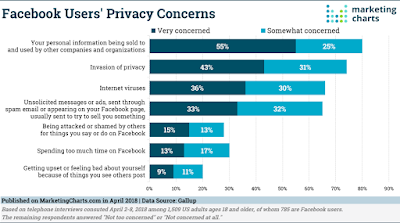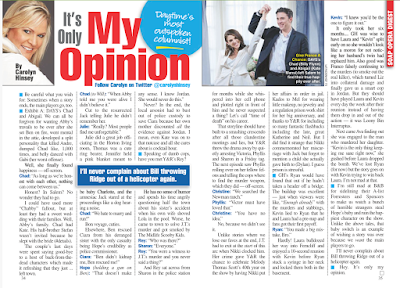Why Instagram is the best social media app
First, let's look at a brief history of social media. According to Wikipedia, "Social media are interactive computer-mediated technologies that facilitate the creation and sharing of information, ideas, career interests and other forms of expression via virtual communities and networks." Social media has been around as long as the internet. Before the Web, there were bulletin board systems that users could dial into, to discuss their favorite TV show, hobby, etc. Where there are multiple users online, there are always arguments, it seems! Then there were chat boards for online services such as AOL, Prodigy, Delphi and CompuServe, as well as Usenet newsgroups. Most people who were online used these services. There were not yet many local ISPs or Web browsers. History of Social Media Video
Once the Web developed and became more popular, there were many more chat rooms, message boards, forums and email lists where people could have discussions about anything and everything. In the early days of the Web, most people also used Geocities, Classmates, Six Degrees and more. The first use of the term "social media"was in 1997. The phrase was coined by an AOL executive. Video: Retro Review- BBS
Most people didn't use the term, though, until after the turn of the century. MySpace was the first really popular social media site, from 2005-2009. Facebook and Twitter became accessible to all in 2006 and then displaced MySpace as users flocked to the newer social media. Instagram started in 2010 and was bought by Facebook. It's very different from the other social media sites/apps because it's primarily for pictures and videos, not text. Video: What Ever Happened to Everyone's Friend MySpace Tom?
Complaints about Facebook and Twitter include: too much arguing; worrying about whether posts expose you to identity theft or can harm you in future employment; exposure to stalkers, trolls and spammers; and annoying ads or aggressive marketing. Video: Why I Like Twitter Better Than Facebook
Instagram avoids most of these problems. For one thing, there are no groups, the way there are in Facebook; so you can avoid strangers a lot more easily. It's been my experience that, unless you have thousands of followers, you won't get many comments, just likes.
Instagram users must post a photo (not just comments). You can post comments with the photo, but not alone. Also, most users post to Instagram with their phone or tablet because it's difficult to post from a computer. There's only one Windows app for posting on Instagram, and it doesn't work all that well. I believe that it's more difficult to post long comments on a phone or tablet, than on a computer, so that is probably another factor.
Lastly, links posted on Instagram are not clickable. Instagram followers can copy and paste the link, but I think that most people are too lazy to do that. Instagram will only allow a clickable link if you are very popular, or if you purchase an ad. Unpaid marketing on Instagram is not as useful as marketing as Twitter/Facebook, since you can only provide one link (in your bio).
Between the eye-pleasing photos and videos that users post, the lack of arguments, and the fact that fewer spammers or marketers can use it effectively, I believe that Instagram is a much friendlier, nicer social media platform than any of the others.
The only drawback to Instagram, just like the other apps, is that there are ads. It's easy to scroll past or hide them, though.
I enjoy Instagram because I like taking photos of beautiful things, with a great camera, and sharing them with everyone (especially friends). I post daily, and often, and I have over 700 followers. Some of my friends have followed me there from Facebook. Besides posting, I love seeing other people's photos of their pets, their children, and their lives as well as funny memes. I enjoy following many celebrities there as well. It's just a fun app to use without all of the drama that you might find in other social media apps.
Please follow me @suzannelanoue
Suzanne's Blog for her class - Mass Media 3503: Mass Media Criticism (for the Mass Communications Degree at Southern Arkansas University)
Tuesday, March 26, 2019
Monday, March 11, 2019
Assignment #6: Criticizing a Critic
Keeping it Real in Soaps
Carolyn Hinsey is a journalist who got her start at the Chicago Tribune in 1981, learning the newspaper business from the ground up (starting in sales and promotion), and then moving to the New York Daily News in 1985, where she honed her writing skills. In 1992, she became a columnist, and later editor, at Soap Opera Digest. While there, she also still wrote about soap operas for the New York Daily News, and later at the now-defunct Soap Opera Weekly (where she was also an editor), and at In Touch Magazine. She's been at Soap Opera Digest (AKA SOD) since 1992, except for a brief 2 years period where she had to leave to work at In Touch Magazine (when there was a conflict). Many of us who follow the soaps look forward to her column and read it every week. She writes really well and is often very funny.
Besides writing for magazines, she also wrote a book, "Afternoon Delight: Why Soaps Still Matter" (2011), and played herself in the web soap "Tainted Dreams." Hinsey has the distinction of being one of only a handful of well-known soap opera critics, along with Lynda Hersch, Michael Fairman and Michael Logan. Video
To be an honest or opinionated critic means that you will have many fans, but you will also have many people who hate you because they disagree strongly with you. Fans of any kind can be very passionate. Soap opera fans have a well-earned reputation for being a little unhinged. Hinsey has very strong opinions. I don't always agree with 100% of what she says, but I always enjoy reading her column, nonetheless. Although Hinsey is critical of the shows' writing, she is careful never to single out any particular person - either writers, producers nor actors. She writes for a soap opera magazine, and thus has to be careful not to alienate the actors, the shows, or the people running them, for fear of losing access.
One of the things that Hinsey values in the soaps is the use of older characters, or fan favorites. Sometimes they're not used as much as the younger actors or the newer characters. Fans are used to watching the same characters for many years, so they know them well. It works better if the soap writers, when they introduce a new character, find a way to tie that person to the existing characters or families on the show. It's also helpful if they write the character really well to make them interesting, and then give us plenty of time to get to know him/her, before introducing more new characters. In the past, whenever writers have introduced a lot of new characters at once (or a whole family), it hasn't worked. One example of this is the Eckert family that "General Hospital" introduced in 1991. Within a year, they had killed off the father, and we never heard from the mother again. They kept around the more interesting characters for a few more years. Even worse, it was the great Gloria Monty who was in charge of this fiasco. She had previously revolutionized GH (and other soaps from that influence) with her ideas.
Because soap operas have made many cuts to their budgets in the past 25 years, the drop in production values sometimes affects the story. The casts are still large, but instead of having most of them on contract, many are only on "recurring" status, so they can only work certain number of days per week. This means that when they have a wedding or other event, only a small part of the cast is there. This makes the story less realistic because weddings usually have large crowds (soap opera weddings used to have almost everyone attend). The sets are also smaller and often a character's house set will only have a living room, which, again, makes it less realistic because we only see them there. Soap operas need bedrooms! These type of problems are pointed out by Hinsey in an entertaining and effective way.
Soap operas used to be written in a more character-driven fashion, but now they're more story-driven. This leads to problems because they have characters who act in way that are unbelievable, just to suit the story. For instance, if they have a serial killer or other villain, and they want to drag the story out for awhile, they have to make the police and other heroes seem really stupid. This happens quite often on all of the soaps, unfortunately. It's been happening lately with the Ryan/Kevin serial killer story on "General Hospital." It's been happening with the police on "Days of Our Lives" as well.
I've been reading SOD since the 1980's, when I first started watching "General Hospital" and then added many other soaps. Now I only watch one regularly ("The Bold & The Beautiful"), but I still keep up on what's going on in all of the soaps, and who's who. SOD helps me me with that, both the online and offline version. In fact, not only do I pay for a paper subscription, but I also pay for an online subscription via Zinio because I used it for my site (and the paper copy is often late). Hinsey is about my age, so she and I both have a long history of watching daytime TV. I've only been writing about them for my site since the 1990's, though. I can only hope that one day I'll be half as good of a writer as she is.
You can find Carolyn Hinsey's column, "It's Only My Opinion," in the pages of Soap Opera Digest. You can also find her on Facebook, Twitter and LinkedIn.
One of the things that Hinsey values in the soaps is the use of older characters, or fan favorites. Sometimes they're not used as much as the younger actors or the newer characters. Fans are used to watching the same characters for many years, so they know them well. It works better if the soap writers, when they introduce a new character, find a way to tie that person to the existing characters or families on the show. It's also helpful if they write the character really well to make them interesting, and then give us plenty of time to get to know him/her, before introducing more new characters. In the past, whenever writers have introduced a lot of new characters at once (or a whole family), it hasn't worked. One example of this is the Eckert family that "General Hospital" introduced in 1991. Within a year, they had killed off the father, and we never heard from the mother again. They kept around the more interesting characters for a few more years. Even worse, it was the great Gloria Monty who was in charge of this fiasco. She had previously revolutionized GH (and other soaps from that influence) with her ideas.
Because soap operas have made many cuts to their budgets in the past 25 years, the drop in production values sometimes affects the story. The casts are still large, but instead of having most of them on contract, many are only on "recurring" status, so they can only work certain number of days per week. This means that when they have a wedding or other event, only a small part of the cast is there. This makes the story less realistic because weddings usually have large crowds (soap opera weddings used to have almost everyone attend). The sets are also smaller and often a character's house set will only have a living room, which, again, makes it less realistic because we only see them there. Soap operas need bedrooms! These type of problems are pointed out by Hinsey in an entertaining and effective way.
Soap operas used to be written in a more character-driven fashion, but now they're more story-driven. This leads to problems because they have characters who act in way that are unbelievable, just to suit the story. For instance, if they have a serial killer or other villain, and they want to drag the story out for awhile, they have to make the police and other heroes seem really stupid. This happens quite often on all of the soaps, unfortunately. It's been happening lately with the Ryan/Kevin serial killer story on "General Hospital." It's been happening with the police on "Days of Our Lives" as well.
I've been reading SOD since the 1980's, when I first started watching "General Hospital" and then added many other soaps. Now I only watch one regularly ("The Bold & The Beautiful"), but I still keep up on what's going on in all of the soaps, and who's who. SOD helps me me with that, both the online and offline version. In fact, not only do I pay for a paper subscription, but I also pay for an online subscription via Zinio because I used it for my site (and the paper copy is often late). Hinsey is about my age, so she and I both have a long history of watching daytime TV. I've only been writing about them for my site since the 1990's, though. I can only hope that one day I'll be half as good of a writer as she is.
You can find Carolyn Hinsey's column, "It's Only My Opinion," in the pages of Soap Opera Digest. You can also find her on Facebook, Twitter and LinkedIn.
Wednesday, March 6, 2019
Assignment #5: Movie Review
"The Last Laugh" Is Chuckleworthy for the Olds
I really enjoyed this movie, which stars Chevy Chase and Richard Dreyfuss as a couple of retired show business guys who go on one last road trip. I wasn't sure what to expect, quite frankly, because so few comedy movies and TV shows that I've seen recently are funny. They usually have gross-out scenes for the 13-year-olds to enjoy, or they have weird, quirky characters that are absurd, but not funny. The characters in this movie are very real, yet they're funny. They tell lots of jokes because it's about comedians. Trailer
Al Hart (Chase) is a retired manager of comedians. He doesn't want to be retired, but he has no more clients, and his granddaughter is pressuring him not to live alone anymore, due to a few accidents he's had. He reluctantly goes to a retirement home, where he sees Buddy Green (Dreyfuss), an old comedian that he once represented. Chase and Dreyfuss have great chemistry, which makes this movie work. I was surprised that Dreyfuss played the comedian, and not Chase, since Dreyfuss has always been an actor, not a comedian, and Chase is most well-known for his comedy. However, Dreyfuss is a great actor, and he was hilarious in this role. Chase is more serious than usual in this role, but you will recognize the dopey behavior that he's displayed in comedy roles of the past, such as the clueless dad in the "National Lampoon's Vacation" movies.
The movie has a nice blend of comedy and sweetness that's rare in most movies. Usually the filmmakers go overboard with silliness, or the movie is overly sentimental, but this one has a nice balance. I was also worried that it might have a sad ending, since it's about widowers that are close to the end of their lives, but it really doesn't. I found the ending to be completely satisfying.
Hart convinces Green that he needs to go back to being a stand-up comic. 50 years earlier, Green quit to become a podiatrist, just before he was supposed to appear on "The Ed Sullivan Show." He's been content with his successful business and family life, but it's also clear that he missed being on the stage. Green and Hart travel to different towns, where Green tries out his act. It's fun to see how his confidence grows and his act gets more professional. Hart promises Green that he can get him on "The Tonight Show." Andie MacDowell (who's 20 years younger than either of these guys) plays a free spirit that Hart meets along the way. Kate Micucci, whom you may recognize from "The Big Bang Theory" or "Another Period," plays Hart's granddaughter. There are some great cameos by real stand-up comics George Wallace and Lewis Black, as well as veteran comic actor Richard Kind.
There were only a few things that I didn't like: they kept mispronouncing "Tijuana" for some reason; the film's version of Lubbock was nothing like the actual city; and there's a strange fantasy sequence that came out of nowhere. These are minor flaws, though.
I noticed many bad reviews of the movie, which surprised me. I think that if you're over 50, you'll appreciate this movie a lot more. I'm glad that Netflix has realized that it's not just Millennials that binge their streaming content. Watch it now!
Subscribe to:
Posts (Atom)
























